8 Tips for Transitioning to a Managed Service Provider

You're a small business owner who has been wearing many hats lately— the salesperson, the accountant, the customer service representative, and the IT person. You're good at what you do, but you're spread thin.
Technology is becoming increasingly important to your business, but you just don't have the time to keep up with it all. That's where a managed service provider (MSP) enters the picture.
There are many reasons why small and medium-sized businesses choose to transition to managed service providers. Your business may be expanding, and you need more support than you can provide internally. Or maybe you're tired of dealing with IT issues and want to outsource that responsibility to someone else.
Managed service providers can handle your IT needs, so you can focus on running your business. They can help you be efficient, reduce downtime, and improve security. They can also give you peace of mind by knowing your IT is in good hands.
We know that switching to a managed service provider can be daunting. There are many unknowns, and it can be challenging to let go of control. This article will give an overview of what a managed service provider is, the benefits of hiring one, how to choose the right provider for your business, and some tips for making the transition.
Let's get started!
[BLOG_POST_SUMMARY]
Managed service provider
One of the essential components of running a successful business is ensuring that suitable systems and tools are in place. But many companies are uncertain when it comes to technology. It can be especially true regarding managed services providers.
Managed service providers are essential for businesses that want to outsource their IT needs. However, many companies don't understand what managed service providers are or what they do. Consequently, they usually miss out on the benefits managed service providers can offer.

What is a Managed Service Provider?
A managed service provider (MSP) is a company that provides IT support and services to businesses.
Managed service providers typically offer a comprehensive suite of services that can include everything from 24/7 help desk support to data backup and recovery. MSPs often use a combination of on-site and off-site staff to provide support to their clients. They typically charge a monthly fee for their services. This fee can be based on the number of users and the services provided.
As it is becoming increasingly challenging to build an IT department from scratch, businesses are turning towards an MSP for all its benefits. By outsourcing critical IT functions to an MSP, businesses can gain several advantages, including improved system uptime and increased efficiency. In addition, MSPs can provide significant cost savings compared to traditional in-house IT departments.
As the demand for quality IT support continues to grow, MSPs are poised to play an increasingly important role in helping businesses keep their systems up and running.
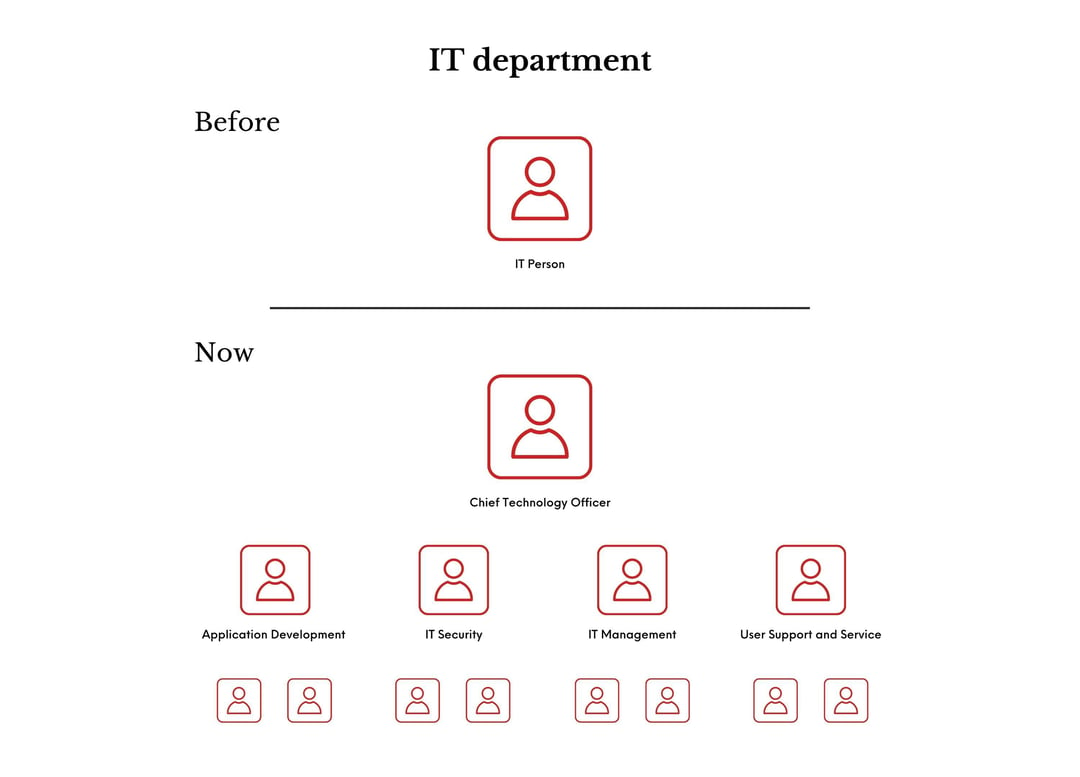
The Types of Managed Service Providers
Not all MSPs are created equal. There are several types of MSPs, each with its strengths and weaknesses. When choosing an MSP, it's essential to understand the different types to select the one that best meets your business needs. The three main types of MSPs are:
Break/fix Managed services providers
These MSPs provide support on a per-incident basis. They typically don't proactively monitor or manage their clients' systems. As a result, break/fix MSPs are often less expensive than other types of MSPs. However, they can be more costly in the long run because they usually don't catch problems until they've already caused damage.

Proactive Managed services providers
These MSPs proactively monitor their clients' systems but don't provide any other type of support. They typically charge a monthly fee for their services. Proactive MSPs can be a good option for businesses with in-house IT staff who need help staying on top of their systems.
Full-service Managed services providers
These MSPs provide a comprehensive suite of IT services, including monitoring, support, and management. Full-service MSPs typically charge a monthly fee for their services. They can be more expensive than break/fix or proactive MSPs, but they often provide a higher level of service.
Depending on what model works best for your business, Genatec adapts to your needs and requirements and offers you the most suitable option.
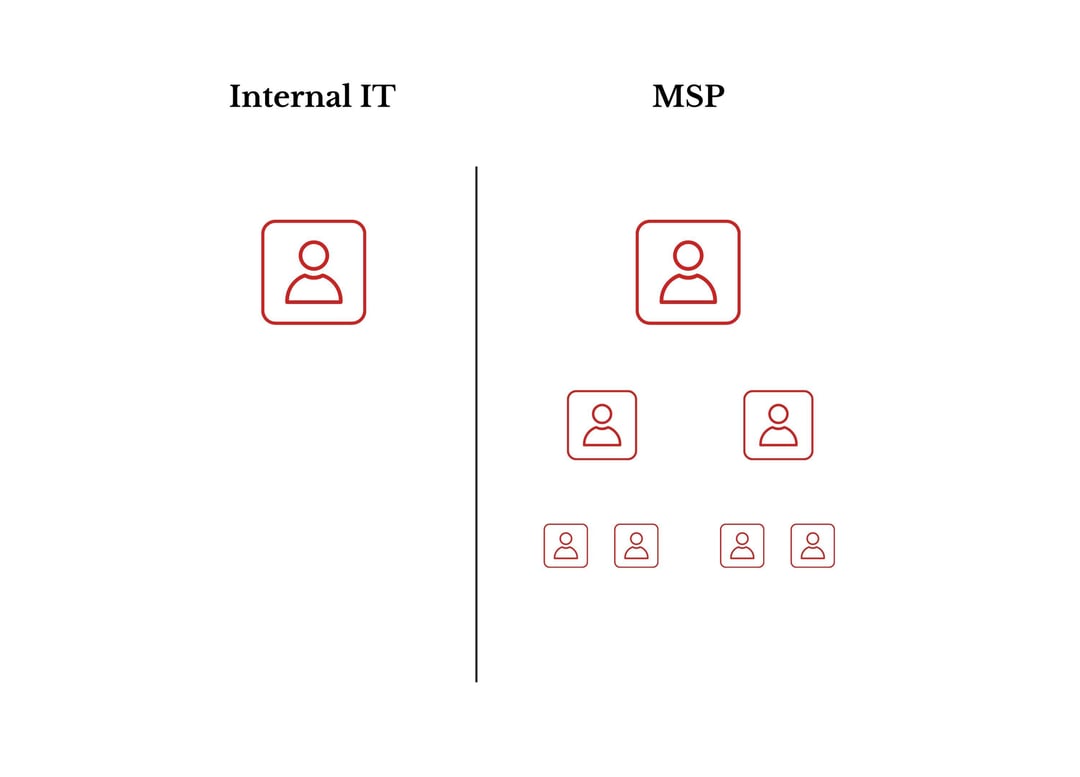
Managed services provided
Managed service providers can provide a wide range of services, including:
Technical support services
This type of support is typically provided on a 24/7 basis. Managed service providers can offer remote support via phone, email, or live chat.
You may also like: 6 Reasons to Invest in IT Support for Your Business
Network monitoring
Managed service providers use special software to monitor their clients' networks. This software can help identify problems before they cause downtime.
Data backup and recovery
Managed service providers can help businesses back up their data and recover it in a disaster.
Software updates
Managed service providers can help businesses keep their software up to date. They can reduce the risk of security breaches and improve system stability.
IT Infrastructure management
Managed service providers can help businesses manage their on-premises IT infrastructure, including servers, storage, and networking.
IT consulting services
Managed service providers can provide businesses with expert advice on various IT-related topics.
Cloud services
Managed service providers can help businesses migrate to cloud technologies and manage their cloud solutions.
Cybersecurity services
Managed service providers can help businesses implement data security solutions, deploy disaster recovery and business continuity plans and monitor their networks for malware and other threats.
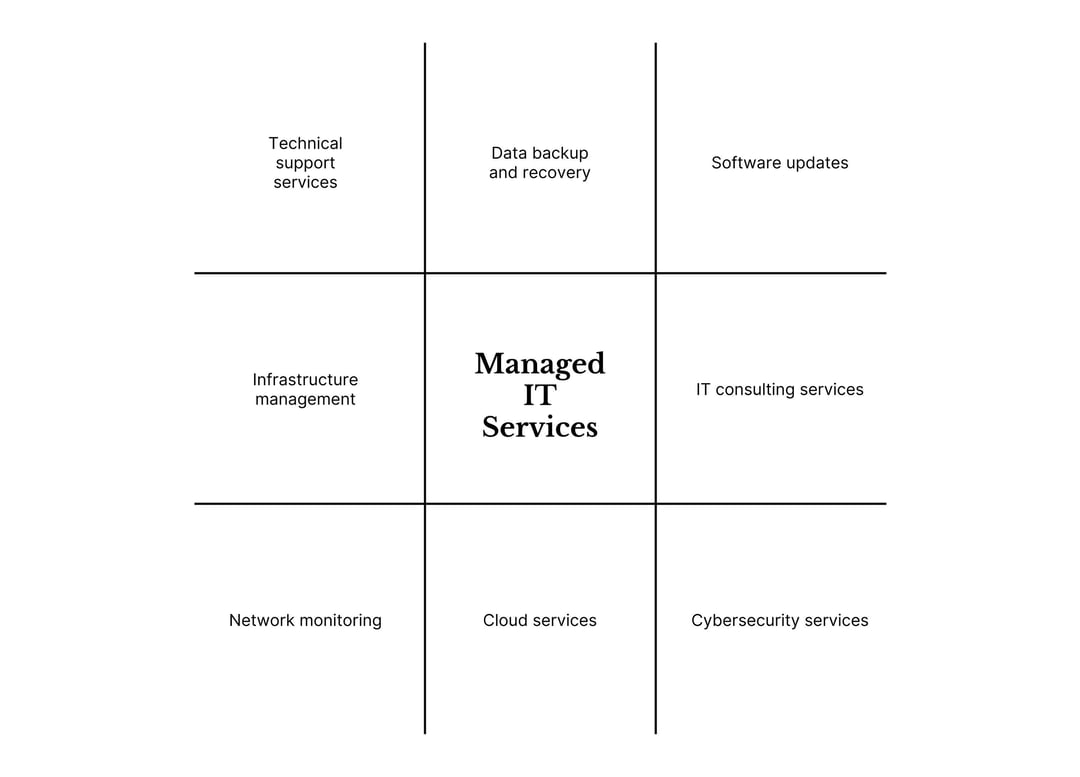
Benefits of hiring a managed services provider
Hiring a managed services provider (MSP) has various advantages. MSPs can save businesses money, improve system uptime, and provide access to a wide range of IT services and expertise.
Cost savings
45% of companies claim that they mainly hire an MSP to save money. Any business owner understands that IT expenses may quickly get out of hand. Between the cost of hardware, software, and staff, it's easy to see how IT can consume a large chunk of your budget.
When 65% of your current IT budget is spent on maintenance, you are missing out on a golden opportunity to outsource that function so that your IT experts can use their skills to promote growth in other areas of your business. However, there is a way to save on IT costs in the short and long run. Managed service providers offer an affordable way to outsource your IT needs.
In the short term, you can save on the cost of building an IT department, hiring and training new IT staff, and managing your own IT infrastructure. In the long term, you can avoid the costly mistakes that can happen when you don't have adequate IT support. Managed services providers can be cost-effective, freeing up more of your budget for other areas of your business.
Genatec helps over 1,500 companies reduce their IT costs by up to 50%.
Access to expertise
One of the main benefits of working with a managed services provider is gaining access to a highly skilled IT professional team. 46% of companies say outsourcing IT lets them access skillsets that aren’t available in-house. With years of experience, IT experts have the expertise to help you with all your IT needs, from setting up a new system to troubleshooting an existing one quickly and efficiently.
In addition, they can provide valuable insights into the latest trends and access to cutting-edge technology and can use them to improve your business. With a managed services provider on your side, you can be confident that your IT needs are in good hands.
With over two decades of expertise, Genatec has successfully solved some of the most challenging problems businesses face in their industries.

Improved security
Keeping your data safe and secure is the most crucial aspect of running a successful business. In today's digital age, companies are increasingly reliant on technology, which means they are also more vulnerable to cyber-attacks. Data breaches can have serious repercussions, including financial loss and damage to your reputation. Therefore, it is essential to protect your data from potential threats.
One way to approach this is by working with a managed services provider. A managed IT service provider will work with you to create a customized security plan that fits the needs of your business. In addition, they can provide you with regular updates and patches to ensure that your system is always up-to-date. They can help you improve the security of your network with their expertise in data backup and recovery, intrusion detection and prevention, and more.
With a managed services provider on your side, you can have peace of mind knowing that your data is safe and secure.
Increased productivity and efficiency
As your company expands, so does the demand for your time and resources. You can't be expected to keep up with every aspect of the company, and that's where a managed services provider comes in.
MSPs offer a 60% increase in efficiency for businesses. By outsourcing your IT needs, you can free up your staff to focus on other aspects of the business. In addition, a managed services provider can help you streamline your operations, making it easier and more efficient for your staff to get work done. As a result, you'll see an increase in productivity and efficiency.
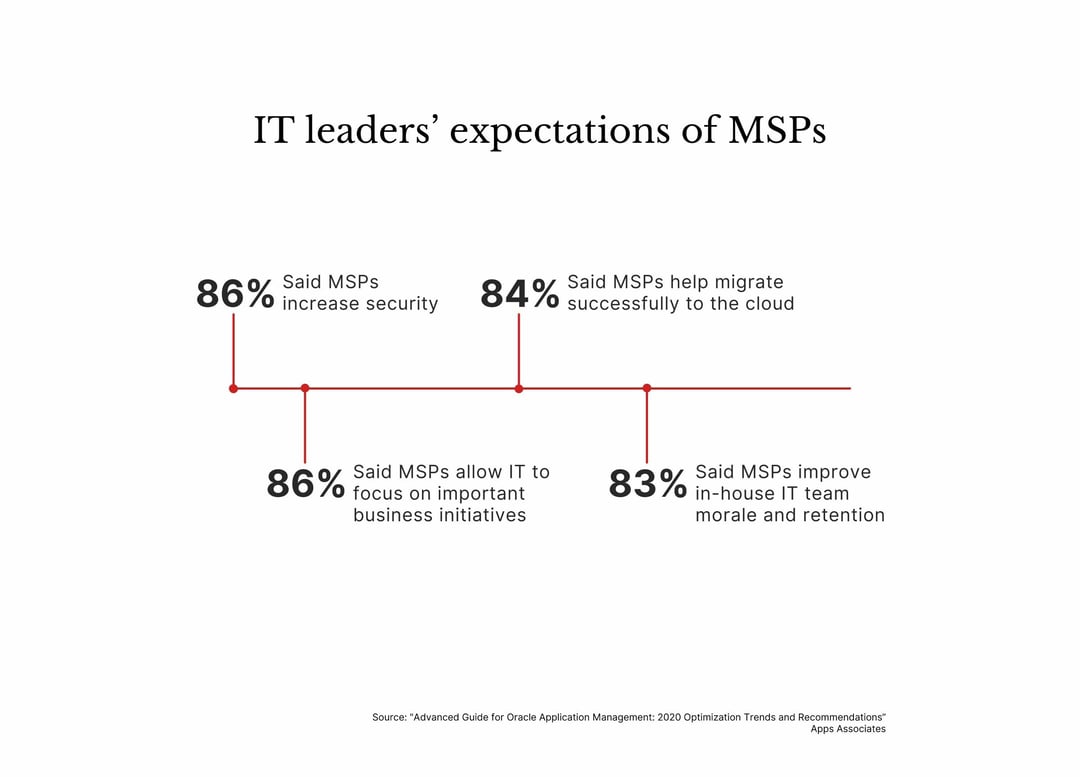
Flexibility and scalability
MSPs partner with various vendors, such as Sage 300 and Microsoft 365, to provide businesses with the latest technologies.
MSPs can help you increase the flexibility of your IT infrastructure by providing services that can be scaled up or down as needed. As your company expands, you can upgrade your services to meet your needs. And if you need to cut back on costs, you can easily reduce the number of services you use.
This scalability means you can always have the correct support level without worrying about overspending. You can save money on unnecessary resources and be prepared for future growth.
Customized plans
When it comes to managed services, one size does not fit all. Every business has unique needs, and a cookie-cutter approach simply won't do. Fortunately, a managed services provider can work with you to create a customized plan that meets your specific needs. They'll take the time to assess your business needs, goals, and budget. Then, they'll develop a plan that includes the services you need and nothing you don't.
As a result, you'll get the support you need to keep your business running smoothly. And because the plan is tailored specifically for your business, you can be confident that it will be effective and efficient.
Working with a managed IT service provider is the best way to ensure your company gets the support it needs to thrive.
Peace of mind
Imagine being able to relax a little bit, knowing that someone else is handling all of your IT needs. Having a reliable MSP can be an immense weight off of your shoulders. With a good MSP in your corner, you'll be able to concentrate on what you do best and leave the technical work to them.
How to choose a managed service provider?
There are different MSPs, so it's essential to take the time to find one that's a good fit for your business. When you're ready to compare your options, look at pricing, service offerings, and customer reviews. By conducting thorough research, you can be sure to choose an MSP that exceeds your expectations.
You may also like: How to Get Started with IT for Small Business: A Complete Guide
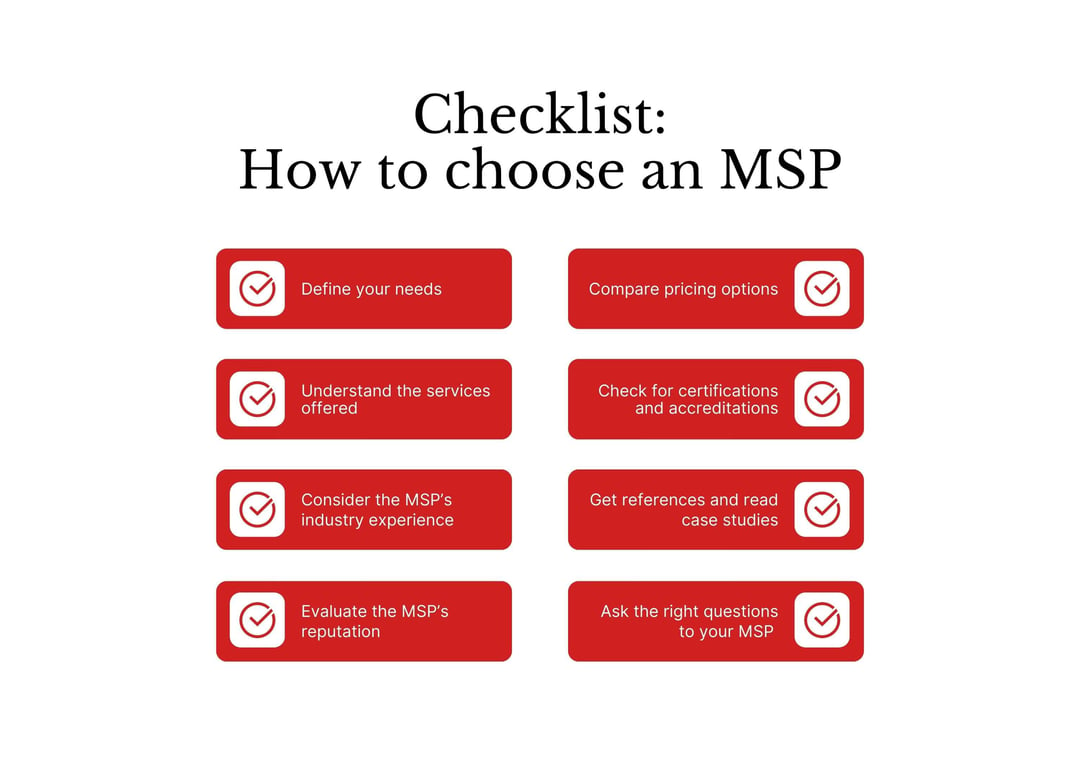
Define your needs
The first step in choosing an MSP is to define your needs. What exactly are you looking for in a managed services provider? Do you need someone to take care of your data backup and recovery? Do you need help with intrusion detection and prevention? Or do you simply need someone to manage your network?
This process begins with assessing your current IT infrastructure and how it aligns with your business goals. Once you identify your needs and requirements, you can evaluate potential MSPs. Look for an MSP that has experience in managing similar IT environments and offers comprehensive services that meet your specific needs.
Furthermore, ask about security protocols, SLAs, and pricing options. By taking the time to define your needs upfront, you will be able to choose the MSP that is best suited to help you meet your IT goals.
Genatec helps you assess your needs through different methods. We develop a needs assessment to evaluate your operations and document your needs and requirements. Then, we perform an IT audit to help you plan and predict costs, prepare for disaster recovery, and future-proof your business.
Understand the services offered
Not all MSPs provide the same services, so it's fundamental to understand what each one does before making a decision. Some MSPs may only provide basic services, such as data backup and recovery, while others may offer more comprehensive services, such as network management and security. Be sure to ask about the specific services provided by each MSP you're considering.
Furthermore, ask about the levels of support offered for each service. For example, some MSPs may only offer limited data backup and recovery support, while others may offer 24/7 support. By understanding the services provided by each MSP, you can be sure to choose one that meets your specific needs.

Consider the MSP's industry experience
When choosing an MSP, it's essential to consider their industry experience. After all, you want to ensure they have the knowledge and expertise to support your specific industry. Ideally, it would help to choose an MSP with experience managing IT environments like yours. This way, you can be confident that they understand the unique challenges that come with your industry. Furthermore, they'll be able to offer tailored services and solutions that meet your specific needs.
Genatec has accumulated expertise working with different industries, from manufacturing to real estate.
Evaluate the MSP's reputation
In addition to experience, you also want to consider a provider's reputation. Talk to other businesses in your industry and see what managed IT services they use. Determine what they appreciate about their provider. Moreover, check out online review platforms like Google Reviews to see what others say about the MSPs you're considering. They are a great way to get an unbiased opinion of what it's like to work with a particular provider.
In addition, reading reviews can help you identify any potential red flags. For example, if you see multiple reviews that mention poor customer service, you may want to avoid that particular MSP. So, by taking the time to read reviews, you will be confident in choosing an MSP with excellent customer service.
Compare pricing options
Finally, you'll want to compare pricing options between different MSPs. Be sure to ask about things like monthly fees, contracts, and discounts. Some MSPs may offer lower prices for more extended contracts, while others may offer discounts for businesses that prepay for services. By comparing pricing options, you can be sure to find an MSP that fits within your budget.
Genatec offers various payment methods according to your needs and budget. Ask us today about our pricing options.

Check for certifications and accreditations
When looking for an MSP, you'll want to ensure they are properly certified and accredited. It is an excellent way to ensure that they are reputable and have the necessary experience to support your IT needs.
Genatec is a Platinum Sage 300 Consulting partner and a Microsoft Gold-Certified partner.
Get references and read case studies
When you're considering an MSP, be sure to ask for references from other clients. They are a great way to get a first-hand account of what it's like to work with the provider. Furthermore, you can ask for case studies to see how they have helped other businesses in your industry. By talking to references and reviewing case studies, you can be sure to make an informed decision about which MSP is right for you.
Ask the right questions to your MSP
Once you've narrowed your options, it's time to interview potential MSPs. Be sure to ask each provider the following questions:
- What services do you offer?
- What levels of support do you offer for each service?
- Do you have experience in my industry?
- What do your customers say about you?
- What are your pricing options?
- Are you adequately certified and accredited?
By asking these questions, you can be sure to choose an MSP that is the right fit for your business.
8 Tips for transitioning to a managed service provider
Now that you used our tips to find the right MSP for your business, it's time to start the transition process. Here are the tips you need to follow to make the switch:
Evaluate your current IT infrastructure
Before you transition to an MSP, you'll need to evaluate your current IT infrastructure. It will help you determine what changes need to be made to accommodate an MSP. Furthermore, it will give you a better idea of what services you need from an MSP.
Define your needs and objectives
Before you start working with an MSP, it's crucial to have a clear understanding of your needs and objectives. What do you hope to achieve by working with an MSP? Do you want to improve your IT infrastructure, reduce costs, or increase efficiency? By understanding your objectives, you can be sure to choose an MSP that will help you achieve them.

Create a transition plan
Once you've evaluated your IT infrastructure, you'll need to create a transition plan. This plan should detail how you're going to transition to an MSP. It should also incorporate a timeline of when each task needs to be completed. By creating a transition plan, you can be sure that the process goes smoothly and that your business is prepared for the change.
Make the transition
Once you've chosen an MSP, it's time to make the transition. This step can take some time to achieve, so plan accordingly. Additionally, you'll want to have a backup plan in place in case of any unforeseen problems. By following these recommendations, you can be sure that your transition to an MSP goes smoothly.
Test and monitor
Once you've switched to an MSP, testing and monitoring your system is essential to ensure everything is working correctly. Keep an eye on uptime, security, performance and quality metrics. If you notice any problems, be sure to contact your MSP so they can help resolve the issue. You can ensure you get the most out of your MSP by testing and monitoring your system.
Utilize all the features and tools your MSP offers
One of the best ways to make the most of your managed services provider is to utilize all the features and tools they offer. By taking advantage of what an MSP offers, you can be sure your business is getting the most out of its IT infrastructure. Additionally, you can use an MSP to improve your business in several ways, such as increasing security, improving efficiency, and reducing costs.

Build a relationship with your MSP
Another way to make the most of your managed services provider is to build a relationship with them. By establishing a good relationship, you can be sure that your MSP is always working in your best interest. Furthermore, you can rely on your MSP for advice and support when making decisions about your IT infrastructure. And most importantly, don't be afraid to ask for help when needed. Your MSP is there to help you, so don't hesitate to reach out whenever you need assistance. By asking for help, you can be sure that your business is getting the most out of your IT investment.
Stay up to date on the newest services and features
As your business grows, your IT needs will change. To keep up with these changes, you'll need to stay up to date on new features and services offered by your MSP. Additionally, you'll want to ask your MSP about new services that might be a good fit for your business. By staying up to date on new offerings, you can be sure that your business is always future-proofed.
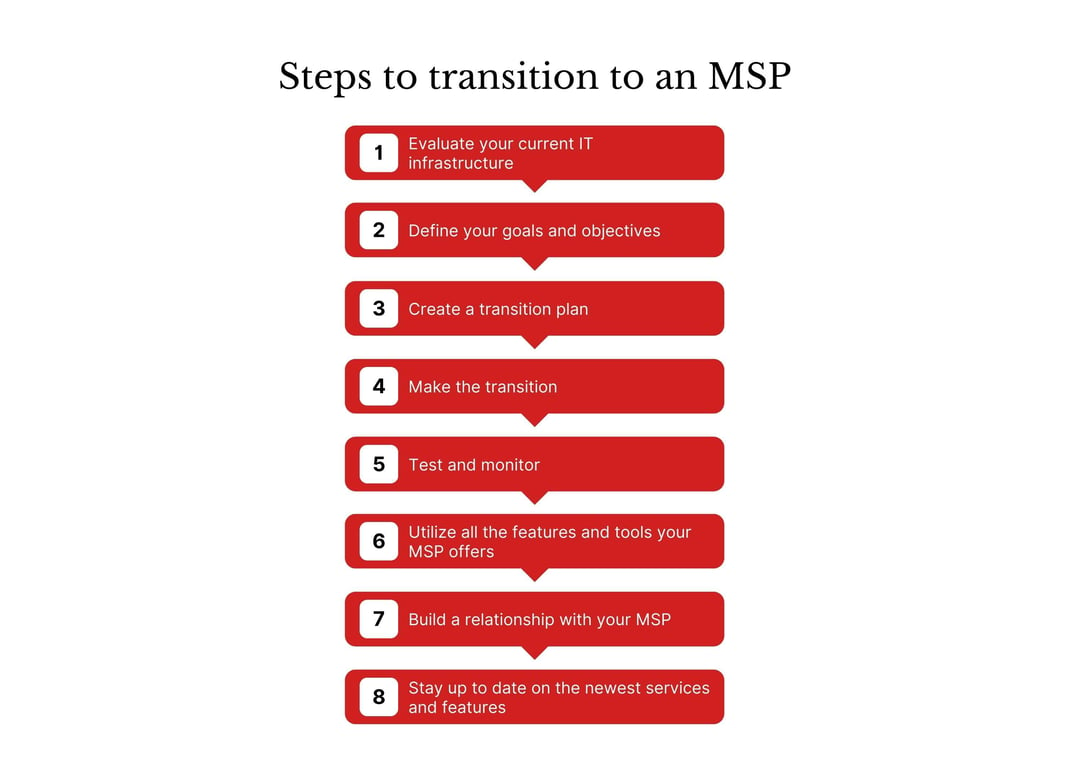
Wrapping up
If you weren't sure about whether or not to hire a managed services provider, we hope this article helped you make a decision. MSPs can provide a variety of benefits that are essential to the success of any business. Not only will they take care of all your technology needs, but they can also help you increase efficiency, cut costs, and improve your overall IT infrastructure.
When choosing an MSP, be sure to do your research and ask for references from past clients. And finally, remember that you should build a relationship with your MSP on trust and communication. By following these steps, you can be sure that your transition to an MSP goes smoothly and that you're benefitting from your investment.
Not sure where to start? We'd be happy to help you switch to managed IT services and leave your IT worries behind. Our IT experts will assess your needs and tailor the perfect solution for your business. Contact us today to get started!
